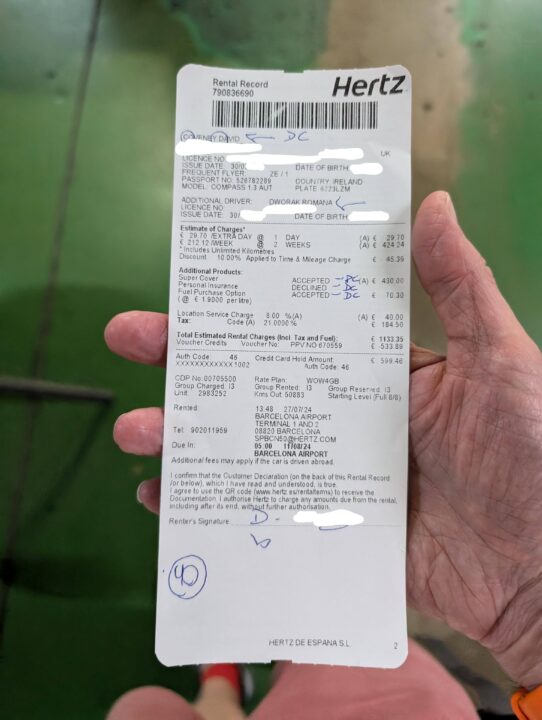This year, during my family holiday, I discovered how Hertz – and many other car hire companies – have crafted a process involving dark patterns to trick stressed travellers into paying far more than necessary for their car hire.
I’ve used Hertz several times over the years, particularly in the 2000s, so I expected good service, a decent car, and straightforward business.
Let’s start with the booking process. It was perfectly fine and straightforward online. The price seemed reasonable, and as the holiday approached, I was actually looking forward to seeing what car I would receive. I even found a potential car upgrade at a slightly lower price when I went back to check some details. Happy days, I thought.
Car collection was quick – no big queue – and the chap at the counter was affable. I was juggling kids and feeling the usual airport stress when he said, “You can have your wife as an additional driver for free, and you don’t have to worry about the excess.” I thought, “Oh wow, that’s great! Romana, do you have your licence?”
He handed me the rental slip, I signed, and at no point did I realise what had just happened.
Great, I thought.
The car, however, was a bit of a disappointment – a somewhat battered Jeep Compass plug-in hybrid. Not ideal when staying at a caravan site. But I coped, thinking it wasn’t worth the hassle to switch cars. Then, midway through the holiday, the engine check light came on. I called Hertz, and they said to drop off the car for a replacement. Brilliant. Except the woman at the counter seemed grumpy about it.
No worries. New car acquired, off we went. It was a Mini Countryman Cooper. Worse spec, but a much better car.
But this isn’t a car review. It’s about how Hertz deliberately created a system that, if you’re not paying attention, can significantly boost their profits.
By my estimation, a rental like mine would typically generate about €40 in profit for Hertz. But through clever design, they turned that into about €450 by breaking the usual patterns.
Step one: when the customer is stressed, offer things that sound helpful but are actually upselling excess waivers and other add-ons.
Step two: sneak in a Fuel Purchase option for €73. I brimmed the car right next to the airport when I returned it, but I won’t see that money back either.
Step three: hand the customer a docket with tiny print (which my ageing eyes now struggle to read without glasses), and ask them to sign here, here, and here – all while chatting away – and with no workflow difference when accepting or rejecting. €430 added there also.

So, because I was busy with the kids, wife, and general airport stress, I signed without paying proper attention. I never usually buy these optional extras.
With taxes, it was just a smidge under €600 in total.
But this time, I accepted the charge. I think I was tricked into it, but there’s nothing I can do. I contacted Hertz, complained, but was told, “No, you signed, you pay.”
And it’s a brilliantly designed system. When you decline, you sign. When you accept, you sign. You get used to signing every time. It’s easy to slip in an acceptance instead of a decline, and then you’re stuck.
So a rental agreement that was supposed to be under €500 turned into €1,133.35 once taxes were accounted for. I’m gutted. Money is already tight this year.
Well done, Hertz and your desk chap. You tricked me out of a substantial amount of money. You win. You’ve increase your profit on this rental by a factor of 10, so even if I don’t use you again for a decade, you’re still ahead. I rarely get tricked, but you managed it.
All I can do now is what I usually do when life hands me lemons—make lemonade, vent on my blog, and move on. I’ve paid my “stupid tax” for 2024. It won’t happen again.
It’s a cleverly designed process they’ve created, clearly aimed at getting people to pay extra at the desk. And it’s not just Hertz that does this—I just expected better from them. They’re supposed to be one of the better firms.
If you were designing the process with the customer not making mistakes in mind, you’d make them specifically write accepted.
The ultimate test as to whether this is sneaky is whether people ever find themselves doing the opposite, and not taking out such cover and extras when they do, in fact, want them.
